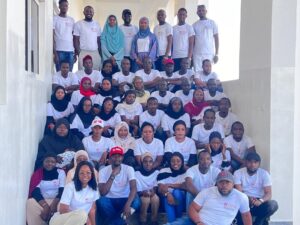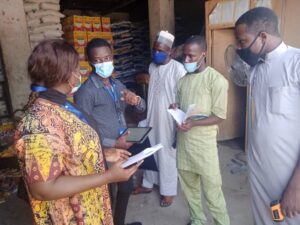By William Bradford, Business Development Associate

Photo 1: ORB Nigeria Office
As seen in the Small Business Association for International Companies “Celebrating the Impact and Achievements of Black- and Women-Owned Small Businesses” Newsletter, July 2024
Since 2019, ORB has supported the Nigeria Monitoring Project (NMP) alongside Management Systems International (MSI) for the USAID Bureau of Humanitarian Assistance (BHA). Under NMP, ORB conducts Third-Party Monitoring (TPM) for over 40 BHA projects in Northeast Nigeria. We verify quality, demonstrate impact, and provide feedback and lessons learned to implementing partners (IP). These services are critical to ensure projects achieve their goals and positively impact beneficiaries.
The Northeastern Nigeria states of Borno, Adamawa, and Yobe are prone to violent extremist organization (VEO) activity1, making them dangerous, and, in some places, completely inaccessible. However, ORB has achieved 100% project completion every month without fail for five years, even amidst adverse conditions such as the COVID-19 Pandemic. Moreover, ORB has maintained industry-leading data quality, established access to non-permissive environments, and facilitated a knowledge-sharing environment among IPs for improved aid coordination. ORB’s focus on local capacity building and joint innovation has been the key to these accomplishments.
Training to Capacity
“When you put time and effort into your local teams, you get good quality back. Enumerators aren’t disposable,” said Ellie Bailey, original project manager of NMP. This has proven true for ORB. ORB implemented a multi-stage training plan to fully equip our local team, beginning with only two sectors in Borno state. ORB headquarters conducted in-country training in Nigeria quarterly for the first year of NMP. In-country training is a regular practice for ORB and is crucial to establish project knowledge and data collection procedures with the local team. Each training instills lessons learned, improves our processes, and fortifies our relationship with the local team.

Photo 2: ORB HQ conducts training with local office
In the first few months, 24.2% of all interviews were flagged for a significant quality control issue. Flagged interviews require enumerators to re-field, which is costly but necessary to ensure verified data. With each subsequent training, however, the team’s quality and capabilities improved. ORB quickly added new sectors and expanded to Adamawa and Yobe states. Soon, the local team also began to conduct their own training internally without HQ assistance. Today, only 2%-6% of the 400-600 interviews ORB conducts monthly are flagged for minor issues.
ORB’s capacity building also allowed our team to innovate in the face of obstacles. The COVID-19 Pandemic halted all travel to and inter-state travel within Nigeria. Face-to-face interviews and observations became dangerous and infeasible to perform, making it impossible to conduct TPM through normal methods. ORB pivoted to remote monitoring, quickly conducting training before inter-state travel was banned. Impressively, the local team continued to complete all 20 site visits each month without interruption while maintaining high data quality standards. Additionally, they innovated by implementing an improved data collection model: limited-contact monitoring.
Limited-contact monitoring is a hybrid data collection approach that uses localized community-based monitors to conduct all in-person observations and interviews and select beneficiaries for phone-based interviews. As residents of BHA project locations, community-based monitors have safe and reliable access to IP sites that are otherwise inaccessible. Limited-contact monitoring significantly improved ORB’s safety, data quality, efficiency, flexibility, and local trust during the Pandemic. It was so effective that we applied it to monitor Deep Site Locations – areas that are inaccessible due to violence, insecurity, or other reasons. This innovation has given ORB unparalleled reach and industry-leading data quality.

Looking Forward
As NMP draws to a close in 2024, ORB celebrates our accomplishment and lessons learned. NMP’s flexible, innovative, local-focused approach has allowed us to consistently provide high-quality data from the hardest-to-reach areas of Nigeria. However, Mubarak Yusuf, the head of ORB’s Nigeria office, is most proud of NMP’s success in “fostering strong community, knowledge sharing, gap identification, and best practice dissemination among BHA IPs.” ORB data has not merely been used to monitor IP projects but to actively improve their implementation to better serve their beneficiaries.
ORB has carried our lessons learned into other TPM and research projects. Our TPM projects in Central Africa and Libya were informed by our successes in Nigeria. We have used training and research techniques perfected through NMP for our projects in the Middle East, East Asia, and Latin America. Our Nigerian office even assists to build capacity in other countries where we work. ORB is thankful to our office in Nigeria and our network of local partners around the world and looks forward to many more years of collaboration to come.
______________________________________
